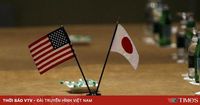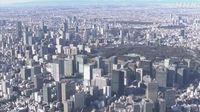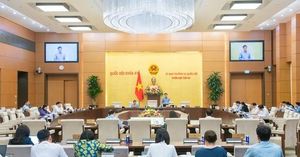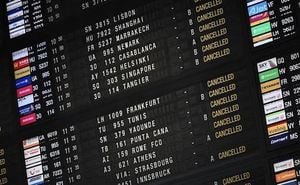In a significant escalation of trade tensions, the U.S. President has announced a reciprocal tariff of 24% on Japanese goods imported into the United States. This move, which is expected to impact a wide range of products, has prompted immediate reactions from Japanese officials, who are now gearing up to negotiate with U.S. counterparts in hopes of resolving the tariff issues swiftly.
On April 14, 2025, Prime Minister Shigeru Ishiba addressed the lower house budget meeting, emphasizing the need for a detailed analysis and a clear approach to non-tariff barriers that may hinder trade between the two nations. "I want to proceed with the most detailed analysis possible. We need to quickly and clearly state how Japan will address non-tariff barriers," he stated, specifically mentioning safety standards for automobiles as a critical area of concern.
In light of the new tariff, Japanese officials are using the recently published 2025 National Trade Estimate Report on Foreign Trade Barriers by the U.S. Trade Representative (USTR) as a framework for their negotiations. Released on March 31, 2025, this extensive report outlines various trade barriers that Japan faces, devoting 11 pages to Japanese trade issues, particularly highlighting the automotive and agricultural sectors.
Among the key points raised in the report is the stringent regulation surrounding foreign automobiles in Japan. Currently, vehicles imported into Japan must undergo rigorous safety checks, which can delay market entry significantly. The report also indicates that Japan's fast-charging standards for electric vehicles (EVs) are a major barrier preventing U.S. EVs from entering the Japanese market.
As part of the broader strategy, the Japanese government is considering easing regulations on foreign automobiles. This includes a proposal that would allow U.S. standards to be used in assessing the results of crash tests, which are currently mandated under Japanese law. A close aide to Prime Minister Ishiba remarked, "We do not think American cars will sell well in Japan even if non-tariff barriers are eliminated, but demonstrating goodwill in modifying regulations will empower us."
In addition to automotive regulations, Japan is also looking into revising barriers affecting agricultural products, particularly rice and pork. The USTR report criticizes Japan's high tariffs and its tightly controlled import system for rice as being "not transparent," raising concerns about the limited availability of American rice in Japan. Regarding pork, the report highlights Japan's use of a mechanism that imposes increasingly high tariffs on cheap imports, effectively restricting their entry into the market.
The situation is further complicated by the fact that Japan's requirements for beef imports necessitate the removal of certain cattle deemed a health risk, a regulation that has been criticized in the USTR report.
On the education front, the report notes that Japan does not recognize foreign universities' campuses within its borders as equivalent to domestic institutions for tax purposes, scholarships, and research grants, which could further complicate educational exchanges.
Ryosei Akazawa, Japan's Minister of Economic and Fiscal Policy and chief trade negotiator, met with U.S. Treasury Secretary Scott Bessent just a week before the announcement of the new tariffs. Akazawa expressed Japan's readiness to discuss non-tariff barriers, stating, "If this topic comes up, we will of course be open to discussions." Bessent echoed this sentiment, expressing a willingness to engage on these issues.
However, experts caution that reducing such barriers could be challenging. Kohei Okazaki, a chief economist at Nomura Securities, noted that many of the issues have been longstanding and difficult to resolve. "It's not easy to implement changes to systems that could increase Japan's procurement costs," he explained, identifying EV charging standards and car key regulations as potential negotiation points.
In a related development, several major Japanese corporations are feeling the ripple effects of the newly imposed tariffs and have begun postponing their corporate bond issuances. Asahi Group Holdings, a leading beer manufacturer, has delayed issuing bonds worth approximately 50 billion yen (nearly $350 million USD), while Nissin Foods Holdings has postponed nearly $280 million USD in bond issuance. Suntory Holdings has also put off a secondary bond issuance valued at around $70 million USD.
All three companies have stated that they have not yet decided on new issuance dates, reflecting the uncertainty in the financial markets caused by the tariff measures from the Trump administration. The 10-year Japanese government bond yield, which serves as a reference for corporate bond yields, has experienced significant fluctuations, contributing to a cautious stance among investors.
Otsu Dai, a corporate bond expert at Daiwa Securities, indicated that investors are currently unwilling to take risks, suggesting that companies are better off waiting for market stability before deciding on new bond issuances. "Companies believe it would be better to wait until the market stabilizes before deciding whether to issue corporate bonds," he noted.
This combination of trade tensions and market instability poses challenges not only for Japanese companies but also for the broader economic relationship between the U.S. and Japan. As both nations navigate these complexities, the coming weeks will be critical in determining how they address these pressing trade issues.





